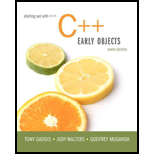
Starting Out with C++: Early Objects (9th Edition)
9th Edition
ISBN: 9780134400242
Author: Tony Gaddis, Judy Walters, Godfrey Muganda
Publisher: PEARSON
expand_more
expand_more
format_list_bulleted
Textbook Question
Chapter 17, Problem 11RQE
Write a function
double lastValue(ListNode *ptr)
that returns the value stored in the last node of a nonempty list passed to it as parameter. The function should print an error message and terminate the
Expert Solution & Answer
Want to see the full answer?
Check out a sample textbook solution
Students have asked these similar questions
Dijkstra's Algorithm (part 1). Consider the network shown below, and Dijkstra’s link-state algorithm. Here, we are interested in computing the least cost path from node E (note: the start node here is E) to all other nodes using Dijkstra's algorithm. Using the algorithm statement used in the textbook and its visual representation, complete the "Step 0" row in the table below showing the link state algorithm’s execution by matching the table entries (i), (ii), (iii), and (iv) with their values. Write down your final [correct] answer, as you‘ll need it for the next question.
4. |z + 5 - 5i| = 7
14.
dz,
C: |z❘
C: |z❘ = 0.6
ze² - 2iz
H
Chapter 17 Solutions
Starting Out with C++: Early Objects (9th Edition)
Ch. 17.1 - Prob. 17.1CPCh. 17.1 - Prob. 17.2CPCh. 17.1 - Prob. 17.3CPCh. 17.1 - Prob. 17.4CPCh. 17.2 - Prob. 17.5CPCh. 17.2 - Prob. 17.6CPCh. 17.2 - Why does the insertNode function shown in this...Ch. 17.2 - Prob. 17.8CPCh. 17.2 - Prob. 17.9CPCh. 17.2 - Prob. 17.10CP
Ch. 17 - Prob. 1RQECh. 17 - Prob. 2RQECh. 17 - Prob. 3RQECh. 17 - Prob. 4RQECh. 17 - Prob. 5RQECh. 17 - Prob. 6RQECh. 17 - Prob. 7RQECh. 17 - Prob. 8RQECh. 17 - Prob. 9RQECh. 17 - Write a function void printSecond(ListNode ptr}...Ch. 17 - Write a function double lastValue(ListNode ptr)...Ch. 17 - Write a function ListNode removeFirst(ListNode...Ch. 17 - Prob. 13RQECh. 17 - Prob. 14RQECh. 17 - Prob. 15RQECh. 17 - Prob. 16RQECh. 17 - Prob. 17RQECh. 17 - Prob. 18RQECh. 17 - Prob. 1PCCh. 17 - Prob. 2PCCh. 17 - Prob. 3PCCh. 17 - Prob. 4PCCh. 17 - Prob. 5PCCh. 17 - Prob. 6PCCh. 17 - Prob. 7PCCh. 17 - Prob. 8PCCh. 17 - Prob. 10PCCh. 17 - Prob. 11PCCh. 17 - Prob. 12PCCh. 17 - Running Back Program 17-11 makes a person run from...Ch. 17 - Read , Sort , Merge Using the ListNode structure...
Additional Engineering Textbook Solutions
Find more solutions based on key concepts
The while loop is a _______ type of loop. a. pretest b. no-test c. prequalified d. post-iterative
Starting Out with Python (4th Edition)
What do the Ada and COBOL languages have in common?
Concepts Of Programming Languages
If the bucket and its contents have a total weight of 20 lb, determine the force in the supporting cables DA, D...
INTERNATIONAL EDITION---Engineering Mechanics: Statics, 14th edition (SI unit)
What is pseudocode?
Starting Out with Java: From Control Structures through Objects (7th Edition) (What's New in Computer Science)
True or False: in a subclass, a call to the superclass constructor can only be written in the subclass construc...
Starting Out with Java: From Control Structures through Data Structures (4th Edition) (What's New in Computer Science)
Practice Program 2 used two arrays to implement a simple phone book. A more scalable solution is to make an arr...
Java: An Introduction to Problem Solving and Programming (8th Edition)
Knowledge Booster
Learn more about
Need a deep-dive on the concept behind this application? Look no further. Learn more about this topic, computer-science and related others by exploring similar questions and additional content below.Similar questions
arrow_back_ios
SEE MORE QUESTIONS
arrow_forward_ios
Recommended textbooks for you
 C++ Programming: From Problem Analysis to Program...Computer ScienceISBN:9781337102087Author:D. S. MalikPublisher:Cengage Learning
C++ Programming: From Problem Analysis to Program...Computer ScienceISBN:9781337102087Author:D. S. MalikPublisher:Cengage Learning C++ for Engineers and ScientistsComputer ScienceISBN:9781133187844Author:Bronson, Gary J.Publisher:Course Technology Ptr
C++ for Engineers and ScientistsComputer ScienceISBN:9781133187844Author:Bronson, Gary J.Publisher:Course Technology Ptr EBK JAVA PROGRAMMINGComputer ScienceISBN:9781337671385Author:FARRELLPublisher:CENGAGE LEARNING - CONSIGNMENT
EBK JAVA PROGRAMMINGComputer ScienceISBN:9781337671385Author:FARRELLPublisher:CENGAGE LEARNING - CONSIGNMENT Systems ArchitectureComputer ScienceISBN:9781305080195Author:Stephen D. BurdPublisher:Cengage Learning
Systems ArchitectureComputer ScienceISBN:9781305080195Author:Stephen D. BurdPublisher:Cengage Learning New Perspectives on HTML5, CSS3, and JavaScriptComputer ScienceISBN:9781305503922Author:Patrick M. CareyPublisher:Cengage LearningProgramming Logic & Design ComprehensiveComputer ScienceISBN:9781337669405Author:FARRELLPublisher:Cengage
New Perspectives on HTML5, CSS3, and JavaScriptComputer ScienceISBN:9781305503922Author:Patrick M. CareyPublisher:Cengage LearningProgramming Logic & Design ComprehensiveComputer ScienceISBN:9781337669405Author:FARRELLPublisher:Cengage

C++ Programming: From Problem Analysis to Program...
Computer Science
ISBN:9781337102087
Author:D. S. Malik
Publisher:Cengage Learning

C++ for Engineers and Scientists
Computer Science
ISBN:9781133187844
Author:Bronson, Gary J.
Publisher:Course Technology Ptr

EBK JAVA PROGRAMMING
Computer Science
ISBN:9781337671385
Author:FARRELL
Publisher:CENGAGE LEARNING - CONSIGNMENT

Systems Architecture
Computer Science
ISBN:9781305080195
Author:Stephen D. Burd
Publisher:Cengage Learning

New Perspectives on HTML5, CSS3, and JavaScript
Computer Science
ISBN:9781305503922
Author:Patrick M. Carey
Publisher:Cengage Learning

Programming Logic & Design Comprehensive
Computer Science
ISBN:9781337669405
Author:FARRELL
Publisher:Cengage
Introduction to Linked List; Author: Neso Academy;https://www.youtube.com/watch?v=R9PTBwOzceo;License: Standard YouTube License, CC-BY
Linked list | Single, Double & Circular | Data Structures | Lec-23 | Bhanu Priya; Author: Education 4u;https://www.youtube.com/watch?v=IiL_wwFIuaA;License: Standard Youtube License